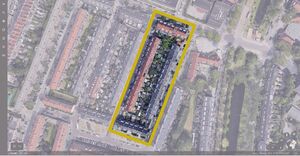Marusa-thesis outline
Who are my neighbours? Do my neighbours know each other? How do they use their gardens?
Keywords: neighbours, gardens, private, public space, nature
Writing style: storytelling, observation records
Understanding garden and neighbour culture
Garden.
Looking at it helps you forget about the grey concrete from the city, it means a quick escape to nature, arranging and caring for plants could be meditative and helps with personal growth. In the country of Slovenia, where I come from, the garden is an important part of living space. Slovenian gardens strive for the fullness of greenery, they usually have space for an outdoor table for warmer days and a part of the garden that is intended for growing home-grown vegetables and fruits.
I am very grateful that I had a chance of growing up in a house with a garden surrounding it. Throughout the whole year we are very engaged with our garden, having different activities. In autumn we prune plants and grab leaves, in winter it becomes a city of snowmen and igloos, I remember that years ago, at my age of 4, when enough snow fell, we even made a micro ski resort where actually I learned to stand on skis. In the spring, the whole family gathers for cherry picking and pruning hedges, and in the summer, we enjoy fresh-air meals and garden parties at every opportunity.
Our house is surrounded by six houses, and one apartment building. Each of these facilities has a garden, overlooking our plot. Residents of the apartment building have divided the garden strategically with no fences, just invisible border and use it to grow fruits and vegetables. I met all the neighbours I know over the fence between our gardens, and the ones I don't know personally, at least I know visually.
[this is a kind of a fast narrative writing, I will change the structure of the sentences but I feel that the concept will be in this direction]
I moved to Rotterdam in September 2020. I live in a multi-apartment house in Oud-Charlois, whose apartments face the central space, where the apartments on the ground floor have their own gardens. Such residential buildings are something quite common in Dutch architecture. My roommates and I live in the upper apartment of the building, so we don't have our own garden, but we have a balcony with a great view of them, where we spend a lot of time. Observing happenings on gardens and their characters, the comparison to Slovenian customs is quite different.
Not wanting to assume with my own prejudices, I decided to investigate/research? the situation.
The first step is to visit all the residents of my own and the opposite building, and if they want to participate, to interview them. I will ask each resident in the ground floor apartments if they would allow me to step into their garden and take a photo of it as well. The resulting series will be a research document.
 There are 84 apartments, of which 42 are ground floors with gardens.
There are 84 apartments, of which 42 are ground floors with gardens.
I don’t count on everyone to participate.
If they have a garden:
I wonder what a garden means to you?
What are you using it for?
How often do you use it?
Would you like to arrange/decorate it differently?
Do you use a shed?
If you had a bigger garden, and you could have anything on it, what would it be?
When buying an apartment, did you specifically look for an apartment with a garden?
What do you think about the idea of a common space / garden?
Do you know your neighbors?
If they do not have a garden:
Would you like to it?
What would you use it for?
Do you use a shed?
What do you think about these gardens?
If you could, would you change anything?
Do you use a balcony and for what?
What do you think about the idea of a common space / garden?
Do you know your neighbors?
I will leave the next steps to the outcome of the interviews.
Introduction <500words>
Chapter 1 <2000 words>
Chapter 2 <2000 words>
(probably in this chapter) Intervijuji in njihova analiza
Chapter 3 <2000 words>
Conclusion <500 words>
